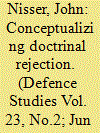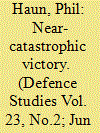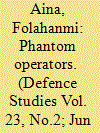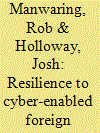|
|
|
Sort Order |
|
|
|
Items / Page
|
|
|
|
|
|
|
| Srl | Item |
| 1 |
ID:
190446


|
|
|
|
|
| Summary/Abstract |
Doctrines are considered a key component of military power, shaping the ways in which armed forces organize and operate. This study critically examines the assumption that armed forces can change their practices by writing formal doctrine. The study addresses the research problem of why some formal doctrines are implemented and others are rejected. It does so by developing and testing a novel theoretical framework on doctrinal implementation through a comparative case study on rejection of the US Army 1976 Active Defense doctrine and successful implementation of the 1982 AirLand Battle doctrine. The study shows that contrary to popular beliefs, the actual concepts within a formal doctrine do not seem crucial for whether it is implemented or rejected. Rather, cultural coherence and inclusive creation seem crucial in this regard.
|
|
|
|
|
|
|
|
|
|
|
|
|
|
|
|
| 2 |
ID:
190444


|
|
|
|
|
| Summary/Abstract |
This study starts from the observation that there is a mismatch, in Brazil, between the strategic actions listed in the National Defense Strategy, and the capabilities of Strategic Defense Companies.
|
|
|
|
|
|
|
|
|
|
|
|
|
|
|
|
| 3 |
ID:
190442


|
|
|
|
|
| Summary/Abstract |
Tensions between Spain and Morocco rose throughout 2021. However, they stem from decades-long conflicts over territory. One of Rabat’s main claims relates to the Spanish cities of Ceuta and Melilla, located on the north coast of Africa. The present article highlights the main clashes between the two countries and their respective positions. It then explores whether Morocco is operating a Grey Zone strategy to secure control over the two cities in the medium term and concludes that this is indeed the case.
|
|
|
|
|
|
|
|
|
|
|
|
|
|
|
|
| 4 |
ID:
190448


|
|
|
|
|
| Summary/Abstract |
This paper examines four of Europe’s more marginal military institutions that receive less attention: the Franco-British Combined Joint Expeditionary Force (CJEF); the French led European Intervention Initiative (EI2); the British led Joint Expeditionary Force (JEF); and the Polish, Lithuanian and Ukrainian joint brigade (LITPOLUKRBRIG). These are described here as “interstitial” because they exist in the niches between both the main multilateral security forums (NATO, EU, UN, OSCE) and the national level. They are intermediaries, working like bridges to cover political obstacles, while often borrowing resources from established actors (notably NATO). It is argued here that such institutions are a form of national hedging against institutional blockages within NATO/EU while providing a platform for national defence policy entrepreneurship. In the context of Cold War 2.0 and Russia’s invasion of Ukraine, such institutional practices should not be dismissed as marginal. They offer a means to deploy European military forces outside formal NATO or EU decision-making structures, a feature which confers a useful flexibility. (161)
|
|
|
|
|
|
|
|
|
|
|
|
|
|
|
|
| 5 |
ID:
190443


|
|
|
|
|
| Summary/Abstract |
The Israeli’s lightning quick victory of June 1967, in the Six Day War, obscured serious deficiencies in Israel’s military strategy. The Israeli Air Force’s (IAF) dependence on a preemptive strike had cost Israel an essential ally and military arms supplier in France. The false assumption that political support would again be forthcoming for a pre-emptive strike was exposed six years later, in the Yom Kippur War. The U.S. military would take lessons from the Yom Kippur War on the lethality of modern battle but observations of the changing character of modern warfare were available in the Six-Day War.
|
|
|
|
|
|
|
|
|
|
|
|
|
|
|
|
| 6 |
ID:
190441


|
|
|
|
|
| Summary/Abstract |
Across the world, Special Operations Forces (SOFs) play a leading role in asymmetric warfare. The unique trainings, skills, weapons, and equipment of these elite Tier 1 operators, differentiates them from conventional forces, making them the preferred choice in complex environments. SOFs are ideally deployed for short operations, which include direct action missions, hostage rescue, hunting high-value targets (HVTs), mobility operations, intelligence operations, airborne operations, counterterrorism (CT), counterinsurgency (COIN) operations, and covert operations among others. While the literature has mostly focused on the utility of major powers’ SOFs in the Global War on Terror (GWOT), with little attention on Africa’s SOF’s, this paper examines the origins, evolution, composition, and deployments of Nigeria’s SOFs specifically in the Northeast, Northcentral, and Northwest theatres of operation, against the Boko Haram insurgency and armed banditry, respectively. Drawing on primary data from interviews with key informants and other secondary data sources, the paper interrogates the successes, challenges, and prospects of Nigeria’s SOFs. The strategic utility and overreliance on Nigeria’s SOFs by political leaders and the Military’s High Command puts a strain on their strategic value which potentially undermines their strategic efficacy as a force-multiplier in the long run, against unconventional threats.
|
|
|
|
|
|
|
|
|
|
|
|
|
|
|
|
| 7 |
ID:
190447


|
|
|
|
|
| Summary/Abstract |
The willingness of defence departments to select the F-35 Joint Strike Fighter (JSF) for their fifth-generation multirole fighter has frequently been analyzed as stemming from the close historical connections allies such as Japan or Canada have with the United States. However, such an approach glosses over or ignores the operation of military procurement processes which are more idiosyncratic and subject to many pushes and pulls from different actors and directions. This article compares the experiences of Australia and Canada in procuring the JSF. Both countries are British Commonwealth members, with a long history of supporting western, and in particular, US alliances. But while Australia has secured its F-35 procurement and the Royal Australian Air Force (RAAF) has already received its F-35s, Canada has only recently overcome a lengthy F-35 procurement battle that remains mired in controversy and will not deliver to the Royal Canadian Air Force (RCAF) an aircraft for several years yet. This comparative case study between Australian and Canadian defence priorities offers a new explanation for this disparity of procurement success based on the need to both create and maintain alignment between government strategic defence policy and military service doctrine if major platform purchasing decisions are to survive.
|
|
|
|
|
|
|
|
|
|
|
|
|
|
|
|
| 8 |
ID:
190449


|
|
|
|
|
| Summary/Abstract |
Cyber-enabled foreign interference remains a key threat to many advanced industrial countries. In many cases, the security response has been to build “resilience” – cyber, national and, increasingly, democratic resilience – in line with whole-of-government and whole-of-society strategies. However, many of these securitised responses are “top-down” and elite driven. These resilience agendas do not pay sufficient attention to the views, concerns and threat-perceptions of citizens, potentially undermining their efficacy. In this article, we focus on the Australian case to better understand how citizen cyber skills, threat awareness, and perceptions of institutional capacity can inform democratic resilience to evolving cyber and information risks. We find strong evidence of a clear gap between citizen views and the securitised responses of governments in dealing with cyber-enabled foreign interference. A further issue from the Australian case is that citizens are framed as a passive strategic resource, rather than conceived of as a potentially substantive partner in a “joined-up” response.
|
|
|
|
|
|
|
|
|
|
|
|
|
|
|
|
| 9 |
ID:
190440


|
|
|
|
|
| Summary/Abstract |
West Africa’s Moratorium on Importation, Exportation, and Manufacture of Light Weapons was adopted in 1998, and the Convention on Small Arms and Light Weapons, their Ammunition, and Other Related Materials was adopted in 2006. The Moratorium and the Convention are more than two decades old, respectively. However, there is little knowledge of their effectiveness in reducing arms flow. This research evaluates how ECOWAS members implemented the Moratorium and Convention to determine compliance trends. It uses a theoretical framework of domestic political legitimacy as a crucial mechanism to explain compliance variations. Political legitimacy is imperative for states’ and domestic groups’ behavior, and its dearth can lead to obtaining arms illegally, which the Moratorium and Convention seek to prevent. The empirics use case studies about Ghana and Côte d’Ivoire to infer how political legitimacy variations influence compliance with the agreement.
|
|
|
|
|
|
|
|
|
|
|
|
|
|
|
|
| 10 |
ID:
190445


|
|
|
|
|
| Summary/Abstract |
This article explores the new research area of so-called strategic facts by examining the theoretical interaction between political and military elements in the context of defence. The research methodology uses a systems-thinking approach to conceptual interpretation. Specifically, the article references the work of French philosopher Émile Durkheim and his notion of social facts. The study concludes by suggesting that it is possible to compile an explanatory framework of the political-military nexus at the strategic level of defence by applying strategic facts as a model for defence analysis. It is also possible to identify strategic facts in the area of “defence as politics.” Further research into this topic would be useful.
|
|
|
|
|
|
|
|
|
|
|
|
|
|
|
|
|
|
|
|
|